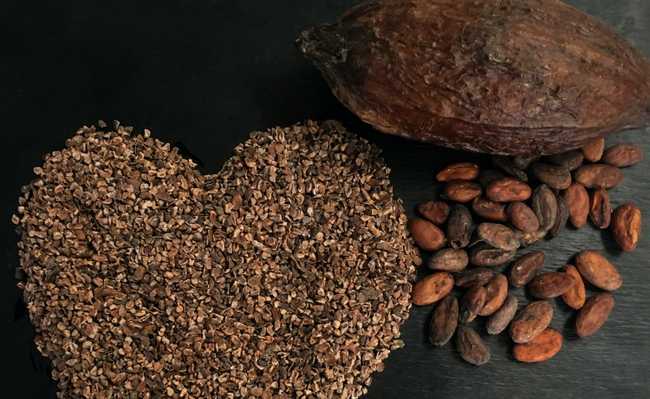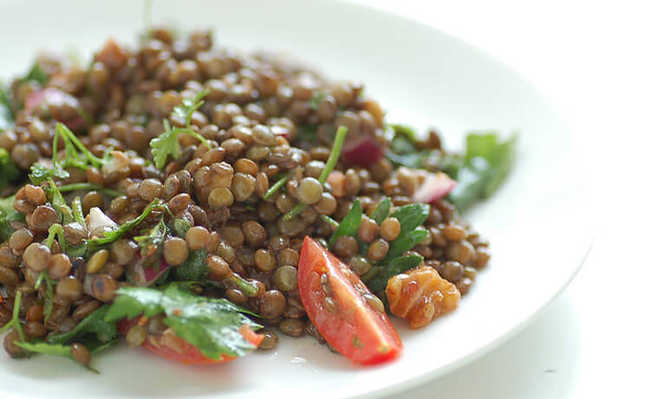What are cocoa nibs and their benefits
Cocoa Nibs are packed with antioxidants and have the potential to prevent cancer, improve immunity and fight heart disease.

Edited and resized image by David Greenwood-Haigh is available on Unsplash
Cocoa nibs are small pieces of ground cocoa beans that have a dark chocolate flavor. They are produced from grains derived from Theobroma cocoa, also known as cocoa. Cocoa beans are dried after harvesting, then fermented and crushed, giving rise to small pieces - or cocoa nibs .
Some types of cocoa nibs are roasted while others are not, the latter are called raw cocoa nibs. Both are rich in nutrients and powerful plant compounds that provide health benefits.
Nutritional properties of cocoa nibs
Cocoa nibs are among the least processed cocoa products on the market and have a substantially lower sugar content than other cocoa products, making them a healthier alternative for chocolate lovers.
In 28 grams of cocoa nibs there are (1):
- Calories: 175
- Protein: 3 grams
- Fats: 15 grams
- Fiber: 5 grams
- Sugar: 1 gram
- Iron: 6% of Recommended Daily Intake (RDI)
- Magnesium: 16% of the IDI
- Phosphorus: 9% of the IDR
- Zinc: 6% of the IDR
- Manganese: 27% of the RDI
- Copper: 25% of the IDR
Unlike other cocoa products, cocoa nibs are naturally low in sugar. They are also a good source of fiber, protein and healthy fats - nutrients that help promote satiety (2).
They are rich in many minerals including iron, magnesium, phosphorus, zinc, manganese and copper. Magnesium is a mineral needed for over 300 different enzymatic reactions in the body, but it lacks the diet of many people (3).
- Your brain loves magnesium, but do you know it?
Phosphorus, magnesium and manganese are vital to keep your bones healthy, while copper and iron are needed for the production of red blood cells that deliver oxygen to your body (4).
Additionally, cocoa nibs are rich in flavonoid antioxidants, which have been associated with numerous health benefits (5).
Rich in Antioxidants
Antioxidants are compounds that help protect cells from damage caused by an excess of molecules called free radicals.
When free radicals outweigh antioxidants, there is a condition known as oxidative stress, which is associated with a number of chronic conditions such as heart disease, certain cancers, mental decline, and diabetes (6, 7).
Cocoa nibs are packed with antioxidants. This includes a class of polyphenol antioxidants called flavonoids such as epicatechin, catechin and procyanidins. In fact, cocoa and chocolate products have the highest flavonoid content by weight than any other food (8).
Flavonoids are associated with many health benefits. For example, research shows that people who consume diets high in flavonoids have lower rates of heart disease, certain cancers, and mental decline (5).
Due to their high flavonoid content, cocoa nibs and other derivatives can significantly contribute to dietary antioxidant intake.
Benefits of Cocoa Nibs
Due to their powerful nutrient and antioxidant content, cocoa nibs have been associated with health benefits.
Anti-inflammatory properties
Short-term inflammation is an important part of the body's defense system and helps protect against injury and illness. On the other hand, chronic inflammation is harmful and has been linked to several health conditions, such as heart disease and diabetes (9).
Increased production of free radicals is a possible cause of chronic inflammation. Antioxidant-rich foods help counteract this effect (10).
Because they are rich in antioxidants, cocoa nibs have powerful anti-inflammatory properties. Research shows that the polyphenols present in cocoa can reduce the activity of the NF-κB protein, which plays a central role in inflammatory processes (11).
Test tube studies demonstrate that cocoa polyphenols effectively reduce levels of inflammatory markers such as tumor necrosis factor alpha (TNF-alpha) and interleukin 6 (IL-6) (12, 13).
Some human studies indicate that cocoa can also reduce inflammatory markers. A 4-week study of 44 men found that those consuming 30 grams of cocoa products that contained 13.9 mg per gram of polyphenols had reduced levels of inflammatory markers (14).
Boosts immunity
The potent anti-inflammatory and antioxidant properties of cocoa nibs can have a positive impact on immune health.
Research shows that cocoa has beneficial effects on your immune system. For example, cocoa flavonoids help to decrease inflammation, which can help improve the overall immune response (15).
Cocoa can also improve the function of gut-associated lymphoid tissue (GALT), an important part of the immune system located throughout the gut. GALT contains approximately 70% of all immune cells in your body (16).
Animal studies have shown that cocoa can have protective effects against food allergies by positively impacting GALT.
Cocoa-enriched diets have been shown to decrease sensitivity to oral antigens - toxins and allergens - by increasing the function of a special layer in the intestine that helps protect against food allergies and maintain intestinal health (17).
A study in rats found that a cocoa-enriched diet inhibits the release of antibodies and inflammatory molecules that lead to severe allergic reactions, such as anaphylaxis, strengthening the immune system (18).
These results suggest that cocoa products, such as cocoa nibs, may be particularly useful for people with food allergies and other immune conditions. However, more research is needed in this area.
May benefit blood sugar control
Cocoa consumption can benefit people with blood sugar control issues.
Human studies have shown that cocoa can help regulate blood sugar control and improve sensitivity to insulin, a hormone that helps cells absorb sugar from the blood.
A study of 60 people found that those who ate about 25 grams of high polyphenol dark chocolate daily for 8 weeks experienced greater reductions in fasting blood sugar and HbA1c (a marker of long-term blood sugar control term) compared to a placebo group (19).
In addition, a recent review of 14 studies in over 500,000 people showed that eating 2 servings of chocolate per week was associated with a 25% reduced risk of diabetes (20).
Cocoa nibs can be one of the best cocoa products to choose from for blood sugar regulation as they are rich in blood sugar stabilizing antioxidants and contain no sugar.
Can improve heart health
Many studies have found that cocoa polyphenols - including catechins and anthocyanins - can benefit heart health in a number of ways.
Cocoa has been shown to reduce numerous risk factors for heart disease, such as high blood pressure and cholesterol levels in human studies.
A review of 20 studies found that consumption of flavonoid-rich cocoa products was associated with a significant reduction in blood pressure (2 to 3 mm Hg) over 2 to 18 weeks (21).
Cocoa ingestion has also been shown to improve blood vessel function, blood flow and HDL (good) cholesterol while lowering LDL (bad) cholesterol and inflammation - all of which may protect against heart disease (22).
In fact, population studies have associated cocoa intake with a reduced risk of heart failure, coronary artery disease, and stroke (20, 23).
Anticancer Effects
The powerful antioxidants concentrated in cocoa nibs can have anti-cancer properties.
Cocoa's antioxidants - including epicatechins and catechins - help reduce inflammation, prevent the spread of cancer cells and induce death in certain cancer cells. Studies demonstrate that cocoa-rich diets stopped the spread of colon cancer cells and induced cancer cell death in rodents (24).
Test-tube and animal studies also show that cocoa beans have protective effects against lung and prostate cancer (25, 26). In addition, population studies indicate that an increased intake of flavonoid antioxidants, such as those found in cocoa nibs, is associated with a reduced risk of certain cancers, including ovarian and lung cancer (27, 28).
Precautions
While it is generally safe to consume cocoa nibs, consider the possible side effects. Cocoa beans contain the stimulants caffeine and theobromine. These compounds provide some health benefits but can cause adverse effects when consumed in excess (29, 30).
Therefore, consuming an excessive amount of cocoa nibs can cause side effects related to excessive caffeine consumption, including anxiety, nervousness and sleep problems.
Remember that children and women who are pregnant or breastfeeding are more vulnerable to the effects of stimulants such as caffeine.
In addition, there is some concern about ingestion of cocoa products in late-stage pregnancy due to the restrictive effects of cocoa antioxidants on a fetal blood vessel called the ductus arteriosus (31, 32).
Lastly, you should avoid cocoa nibs if you are allergic or sensitive to chocolate or food nickel. Never give cocoa and its derivatives to animals such as dogs and cats.
How to add cocoa nibs to the diet
- Add cocoa nibs to your smoothie favorite
- Use them on roasts in Cookies, cookies, cakes and breads
- put in morning oats
- Mix them with nuts and dried fruit for an energetic afternoon snack
- Add cocoa nibs to coffee
- Use in savory sauces
- Mix them in hot chocolate or almond milk
- Mix with coconut chunks, almond butter and date puree to make healthy energy bars
- Use them in place of chocolate chips in granola recipes










